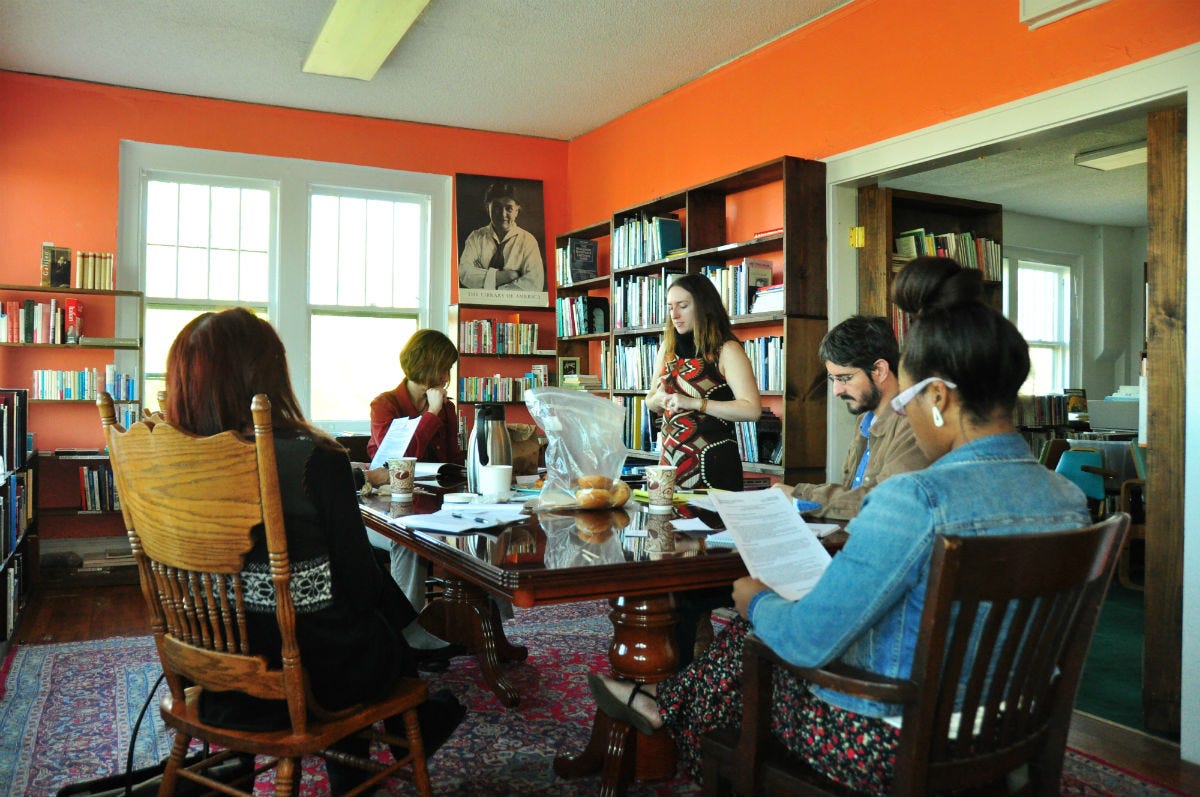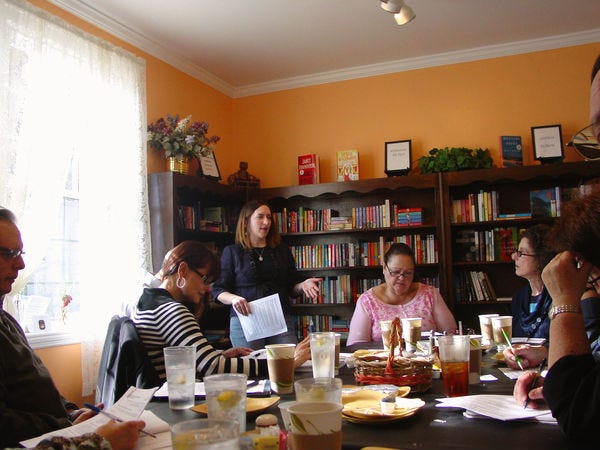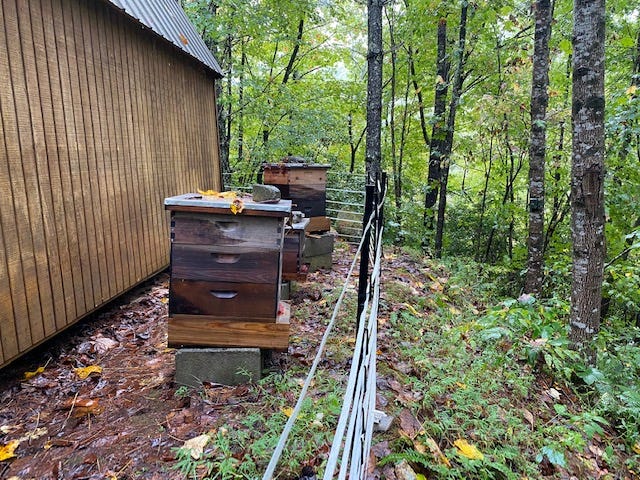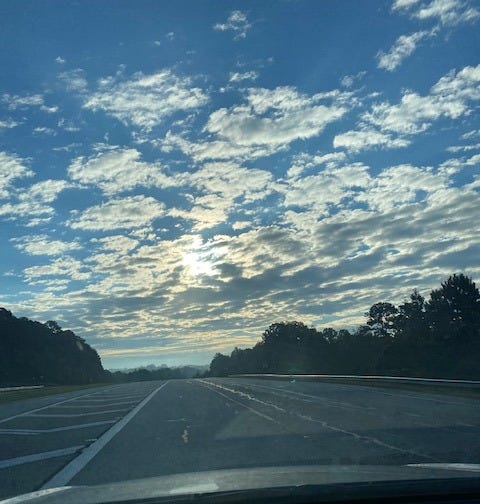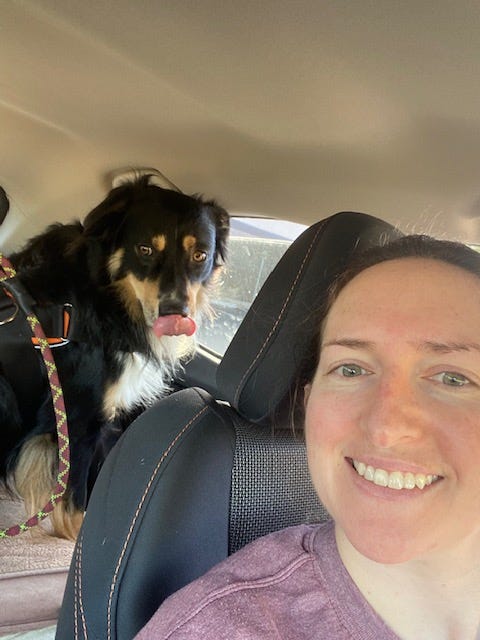My experience through Hurricane Helene in WNC, plus ways to help
My connection to Western North Carolina and being there during an historic storm.
Before getting started, I wanted to share that we came out of the storm completely unscathed. We didn’t even lose power. I’m sharing a bit about my personal connection to the North Carolina mountains, my experience being there through Hurricane Helene, plus efforts you can participate with that can help.
I’m publishing this off of my usual posting cycle because I feel called to help share ways to support the storm survivors in Western North Carolina (WNC). Also, tomorrow’s post is about a special dinner I attended in Asheville last month, and I feel it would be completely tone deaf to share about that experience without acknowledging the utter devastation the region is navigating.
If you’ve been following for awhile you’re aware we split our time between the Piedmont and WNC. My two primary apiaries are in Pittsboro and Robbinsville. This month I’ll celebrate 17 years in North Carolina and I remember visiting WNC that fall and hoping that I could make time to visit the mountains each season. Later, after I had been running my freelance writing business for a few years, I decided to make that happen. I founded Asheville Writers, a writing group that grew to more than 500 members. Each season I held a writing workshop or retreat in Asheville as a way to build community among writers while at the same time satisfy my urge for visiting the mountains (and have a tax-deductible trip too!). I hosted book marketing, poetry, and publishing workshops in downtown Asheville, West Asheville, Montford District, the North Carolina Arboretum, Biltmore Village, Asheville Wordfest, and so many other places. This city has been an important part of my entire experience living in North Carolina.
Back then I was living in an apartment in Cary and hoped to not only one day buy a home in the Triangle area, but also have a property in the mountains too. I had hoped building community through Asheville Writers would create a foundation for that opportunity down the road.
Eleven years ago today my husband (then-boyfriend) moved to North Carolina. We closed on our first home together a few months later. He started coming along with me on my seasonal visits to the mountains, and we also started attending—then later hosting a booth—at Miatas at the Gap every summer at Fontana Village. He loves the mountains more than me now. We were spending so much routine time out there that we invested in property a few years ago.
In a bittersweet turn of events, around the time we found a place in WNC, aging family care and deaths in the family impacted our day-to-day. The stress of caring for aging family is truly unimaginable until you experience it. I made the difficult decision to step down from Asheville Writers, and let the group go on to be shepherded by some of the dedicated members. I no longer had the bandwidth to nurture or participate with the writing community I had built there.
That’s a little about my connection to WNC. I spent my fall equinox time in the mountains, which included my final week last week, the one that marked the arrival of Hurricane Helene. Helene arrived on Friday, September 27. My husband had driven home on Wednesday before the rains were expected to start, and I stayed in WNC with our dog Indy and anticipated driving home Saturday or Sunday after the storm.
By Thursday I realized that I should have had Mike give me a refresher tutorial on the generator. Through cell phone-annotated pictures and some calls, he guided me through starting the generator. I felt comfort knowing it was there, if needed. I went through all of the usual hurricane prep tasks: Pre-cooked meals, filled pots and bottles with water, got all the laundry done, showered, lined up flashlights, kept phone and radio on the charger, parked the car away from the tree line, downloaded maps for offline use, grabbed screenshots of the radar and forecasted storm track and timeline, etc.
Things started to feel eerie on Friday and Indy sensed something was off. He kept lying completely flat on the ground with his eyes staring straight up at the sky—which is not his default daytime laziness behavior. (Usually belly-up and snoring at my feet while I work.) I was working that day and was only interrupted for about two hours at lunch time when our satellite internet dropped. As you can see from the hurricane tracker image I’m including in this post, lunch time was when the eye of the storm passed almost directly over me.
There were some moments in late afternoon when a few gusts of wind felt ominous, but I quite literally mean a few. Maybe 3? It didn’t feel like much of anything, but there was some spooky quality to the rain and energy in the air that made it feel completely different than a rainy afternoon. I waited until later in the evening after the winds had died down and the clouds parted to blue before I walked down our driveway and our road. We have a spring and pond that parallels and crisscrosses our driveway. The road to our cabin is one way in and one way out, and that too has a (much bigger) creek that similarly parallels and crisscrosses the road—and one crisscross is where the creek moves under the road at the base of our driveway. I had expected to walk down there and greet a raging river rather than a road, but nothing seemed off-kilter. The spring and creek were fairly normal, and our pond never overflowed. I walked the length of our road to the highway, a little more than a half mile away. Everything looked fine. The sky turned a few magnificent shows during my walk, which made me feel so comforted. I had no idea at the time about the level of devastation other parts of WNC were experiencing.
Shortly after my surveillance stroll, my cell service and internet completely dropped. Like so many others in WNC, there was no way for me to share that I was safe nor see what was going on. While I only experienced that for 2 hours before our internet came back online, thousands of people are still experiencing that lack of connection nearly a week later.
Having the internet back, I quickly checked news, maps, weather, and texted with my husband about the best route to take—targeting Sunday—just in case I lost service again and couldn’t relay plans. The two most helpful resources during this rapid flurry of planning were Reddit (the r/Asheville thread) and the Georgia DOT 511ga.org maps. Instead of taking the usual route home via I40 east through Asheville (which experienced a landslide and was impassable), I decided to take a wide berth around the greater Asheville region and head south to Georgia where I could pick up I85.
I left Robbinsville an hour before sunrise on Sunday, less than 48 hours after Helene hit. I packed the car with a few meals, a ton of water, all remaining dog food, lanterns, blanket, hiking boots, toilet paper, and an emergency radio—not knowing if I would get stranded with Indy. I took Highway 28 through Franklin, down 23 to 17 and stopped there before the I85 ramp for a quick break. It took 2 hours to get there and I had no cell service the entire time. I85 was the first spot service came back.
The first leg of the drive on Highway 28 was extremely twisty-turny and usually one I avoid when I visit Franklin because I’m not a fan of the windy roads. (I leave the windy “fun” runs to my husband!) Funny thing is that the route I usually opt to take to Franklin is a dirt road (Needmore Road) along the Little Tennessee River, which I knew was not an option that day. Windy 28 was the part I was most concerned about since it has rockfaces that could have fallen, and lots of trees and powerlines. However, I didn’t even spot a leaf in the road. It was entirely clear.
Every town I drove through had power and every gas station was open—and I didn’t spot any bags on pumps to indicate the pumps were closed. I passed through North Georgia and into South Carolina. I made my way back to North Carolina, passing Charlotte on my way home. It’s remarkable so many resources are intact and available with the volume of folks stranded in the Appalachia hills.
Levels of guilt and relief keep bubbling up. Why did we sail through the storm when so many others were crushed? What does this mean? Since we came out of this experience safely, I feel deeply called to use our resources to spread the word about ways to help.
How to help WNC hurricane survivors
Reverence Farms, a farm not too far from my home, is organizing incredible resource collection and drop-offs. They’ve partnered with a 501(c)(3) nonprofit, Knowing Love Ministries, so contributions are tax-deductible.
Samaritan’s Purse - A 501(c)(3) charity helping to respond to people in a crisis.
A number of farms have their own Go Fund Me campaigns:
Happy Hens and Highlands in Burnsville
Disaster recovery for WNC beekeepers with losses
Get sugar syrup for hungry bees from the Greater Good Charities honey bee project.
According to a note sent from David Tarpy at NC State, his area proposed an initiative between NC State Beekeepers Association and its chapters, plus the NCDA&CS Apiary Inspection Service, and the NC Cooperative Extension Service, to give nucleus colonies and hive equipment to beekeepers next spring who lost hives or equipment in the storm. More resources at NC State Extension Disaster Information Center.
Get money from the USDA FSA service ELAP program to replace hives. Rick Coor, president of the NC State Beekeepers Association, sent a note to members sharing that he received funding during prior hurricane loss. You can receive $230 per hive but you have to apply. Your NCSBA Regional Director and your apiary inspector can help with the necessary documents. Visit fsa.usda.gov/ELAP. To apply for help, visit your local FSA office. You will need: Notice of Loss and an Emergency Loss Assistance for Honeybee Application. Find your local FSA office at farmers.gov.
Help distribute resources
The biggest issue for support teams right now is logistical delivery. Road loss and waters prevent resource deliveries. Many areas can only receive goods via helicopter, which comes with inherent weight limits. And water is heavy. If you have air resources, ATVs, mules or horses, watercraft, and wish to help—contact sheriff offices in WNC counties.
Permaculture design for resiliency
This storm prompted many people to think about their landscapes in new ways. Visit my earlier posts including permaculture design for climate resiliency.
Keep sharing ways to help
If you’re unable to contribute financially or with time, please create a dialogue. Whether digitally or analog, talk about this. Talk about ways to help. Talk about ways to prepare. Talk about ways to evacuate. Keep the conversation going.




